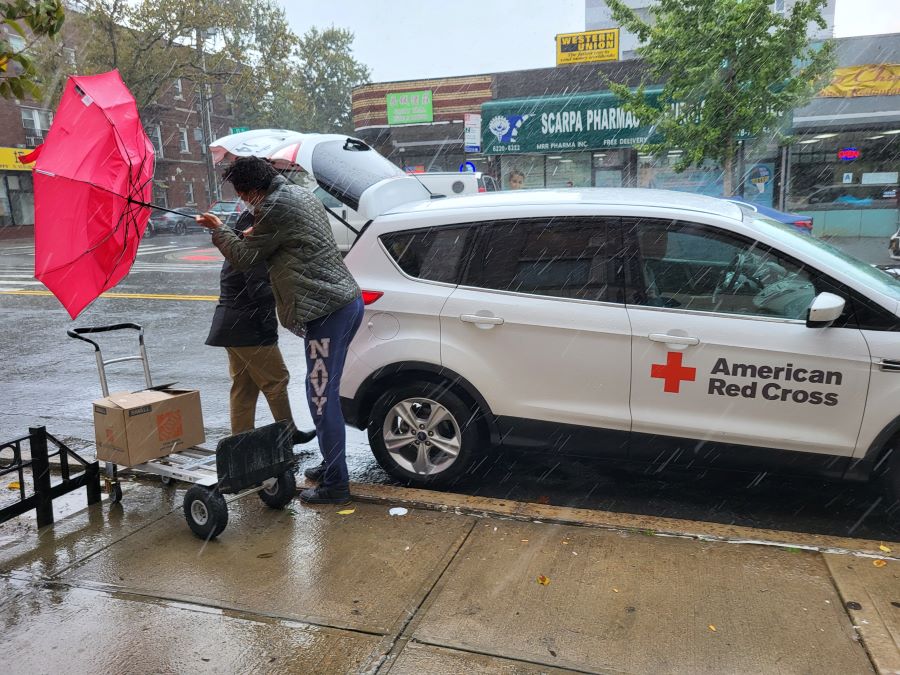
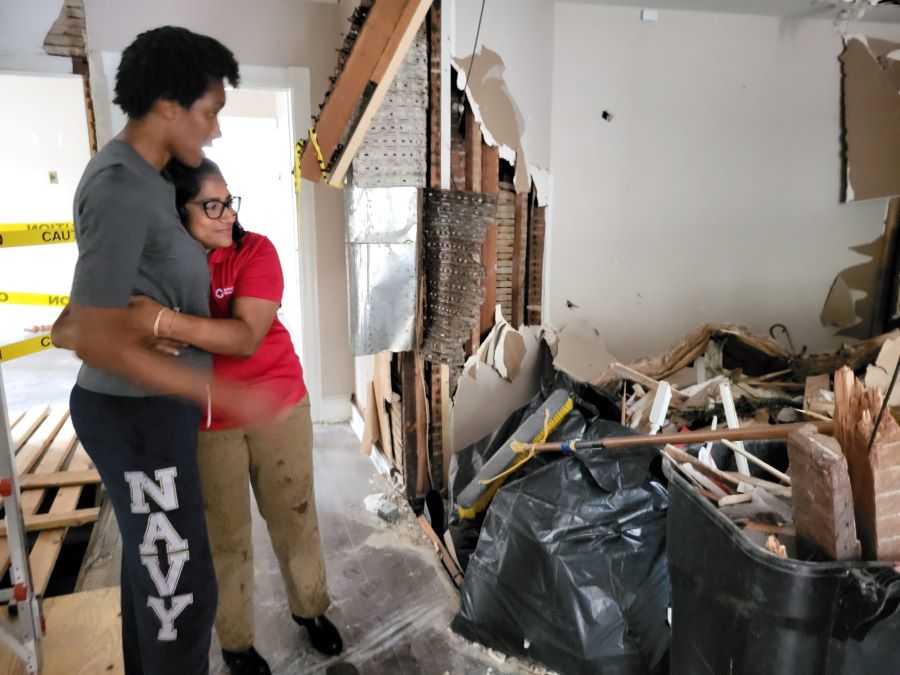
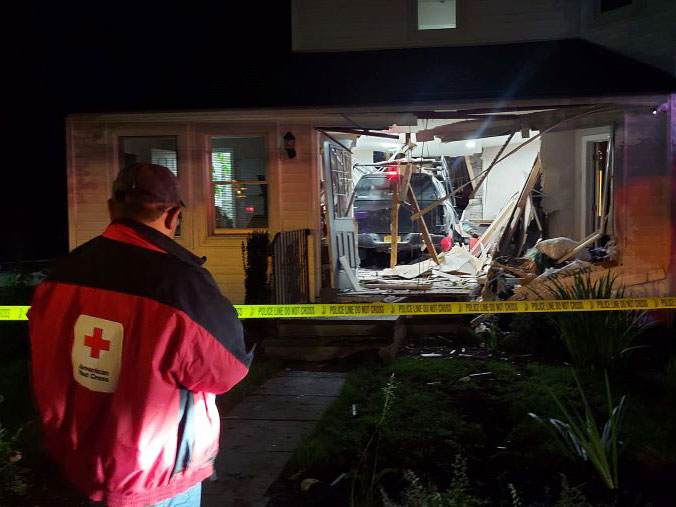
The night was quiet. Just after midnight on September 16 of this year, Martha Richardson was sleeping soundly in the upstairs bedroom of her house in Huntington, N.Y. She was resting to be ready to work an overtime shift the next day — a Saturday — so she could earn extra money to pay tuition for her two kids in college. Unbeknownst to her, a drunk driver in a pickup truck was careening down Oakwood Road toward her house. Suddenly his truck hit and bounced off two parked cars before flying over a garden median in the intersection of High Street, heading straight for Martha’s home.
BAM! Before Martha was fully awake, wood and plaster were raining down on her — jolting her upright and into a panic.
“At first I thought it was a human that hit me because it was so painful,” Martha, a five-year Navy veteran who has worked for the U.S. government for 20 years, said. “And then I jumped up off the bed, took a couple steps back to see who was in the room, and I stepped on something sharp on the floor. I couldn’t see, and then I realized something was wrong because the floor wasn’t even. The house was engulfed in smoke, and my eyes were just on fire.”
She called her 19-year-old daughter, Mariah, who is studying at New York University’s Shanghai, China, campus. Mariah smartly told her mother to turn on the video function on WhatsApp so that she could see what was happening in the house.
“She said ‘Turn on the light, Mom. Go to the kitchen.’ And I turned on the light like she told me to, and it was just smoke. She said, ‘Don’t move, Mom, there’s no steps there!’ And I didn’t see that, she saw that. She said ‘Mom, there’s a truck there!’ She saw the truck before me.”
Martha would later learn that the drunk driver had plowed through the side of her house, taking out the entire staircase to the upper floor. The vehicle, which almost went through the other side of the house, had come to rest in the living room, where the family that shares the house with Martha and her kids often watched television on Friday nights. Fortunately, they were in the kitchen getting ready to eat a pizza after returning from seeing a show earlier that evening — a twist of fate which may have saved their lives.
Martha was stuck in her smoke-filled bedroom until firefighters arrived and used a harness to help her escape out a second-story window and down the shingled roof. They explained what had happened and told her that the American Red Cross had already been called to the scene to help her and the other family deal with the aftermath of the accident.
“[The last two weeks have] been a nightmare from hell, but if it wasn’t for the American Red Cross, I wouldn’t have food in my belly,” Martha said recently. “They pulled in like the U.S. Navy. The people had bookbags, had water, toiletry bags, blankets, and they were so sensitive to what we were dealing with out there. They checked on me, they took me away from the scene and made sure I was all right. I had Mariah on the phone, and they talked to her too. They took care of me as if I was their child.”
The Red Cross typically responds to more than six emergencies every day in the Greater New York region. There are resources available to everybody who needs help after a disaster, that may include financial assistance, toiletries, blankets, change of clothes, snacks, water, and informational resources. For veterans like Martha, there are often additional resources available from a variety of community and government partners. The Red Cross hosts a national hotline for our Hero Care Network, which provides services for military members, veterans, and their families worldwide. Local disaster responders can also refer cases to Hero Care Network caseworkers when a veteran or active-duty service member is involved.
In Martha’s case, the Disaster Action Team (DAT) responders on duty, Celia Vollmer and Edras Hidalgo, arrived at the damaged house and got to work. Once they identified Martha as a veteran, they immediately connected her to an active-duty U.S. Army sergeant (and Red Cross volunteer) who helped walk her through the steps she would need to take to get back on her feet and the services available from the military.
“I called [DAT] team member Tim Bulmer to give her a call since he was active-duty armed forces,” said Celia Vollmer, one of the Red Cross DAT responders that night along with Edras Hidalgo. “He spoke with her several times and gave her resources and guidance. Unbeknownst to us, Tim was deployed to Europe. He made time while he was overseas to offer comfort and reassurance.”
That same night, Red Cross workers with Disaster Health Services and Disaster Mental Health assessed and addressed Martha’s needs. Due to her veteran status, the Red Cross helped her secure a bed in a veterans’ shelter on Long Island for the next couple of days.
Lallita Maharaj, a Hero Care Network caseworker who is part of the Service to the Armed Forces (SAF) team for Greater New York, said she received a call from Vito Reciniello, Disaster Program Manager on Long Island. Vito compassionately shared Martha’s situation and told her what DAT had already done to help her, asking if there was anything SAF could do additionally.
“I called her to make sure she was safe, and then I put my social worker hat on and started reaching out to our other lines of service and our community partners to see where we could help her,” said Lallita. “All our Disaster Program Managers and caseworkers got involved, each exploring resources to help find her a place to live. Our disaster caseworkers secured her a bed at the Northport Veteran Shelter. She was grateful to have a place to stay.”
Unfortunately, it was still a 3-hour commute to her office at the VA Hospital on East 23rd Street in Manhattan. She needed to be at work at 7 a.m., but the first bus didn’t start running until 7:30, so she had to walk three miles to the Long Island Railroad. Still, she had been late to work two days in a row and her boss was not happy. Fortunately, unbeknownst to Martha, Lallita and her Hero Care Network caseworkers were already hard at work behind the scenes.
Lallita was able to tap into an extensive network of community and government partners to find Martha a longer-term housing solution that was closer to work. An available bed was secured at a veterans’ shelter in Brooklyn, reducing Martha’s commute to 40 minutes. Martha can stay there for up to six months — or longer if permanent housing is being arranged. Meanwhile, Lallita, the Red Cross, and community partners continue working to help her find permanent housing, figure out how to pay a rental deposit, get new furnishings, and meet other needs that may arise.
“Life can change in the blink of an eye,” Lallita said, explaining why she dedicates her time to the Red Cross Service to the Armed Forces and Hero Care Network. “Living from a place of gratitude, I recognize the sacrifice of our service members, veterans and their families. It just fuels my passion to continue to live the Red Cross mission. Since I can’t change what happened, I can try my best as a member of the Red Cross to make the journey to recovery a little easier with the help of all those that support our military. Working with other lines of services on this case made me even prouder to be a Red Crosser. We truly are One Red Cross.”
Martha’s story with the Red Cross continued for several months following the disaster in her home in September 2023. During her six-month stay at the Patriot House, a veterans shelter in Brooklyn, her caseworker, Kurby Velez, worked with her to explore permanent housing options. He was able to help her find something in her budget in the Bronx. Meanwhile, a Greater New York Service to the Armed Forces caseworker continued to explore resources that could help Martha after she found a new place to live. Lallita made a call to General Needs, a local nonprofit partner that provides services for veterans. Once the necessary paperwork was submitted, they generously donated furnishings for the new apartment — kitchen appliances, bedding, a television, cleaning supplies, a new bed, and much more. Now, Martha eagerly awaits her daughter’s return home from college for the summer and continues to plan her eventual return to living on Long Island.
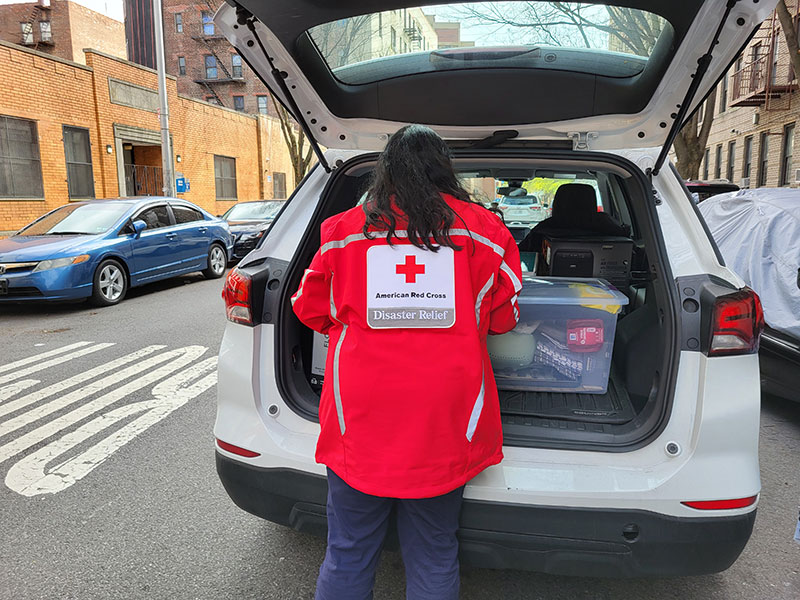
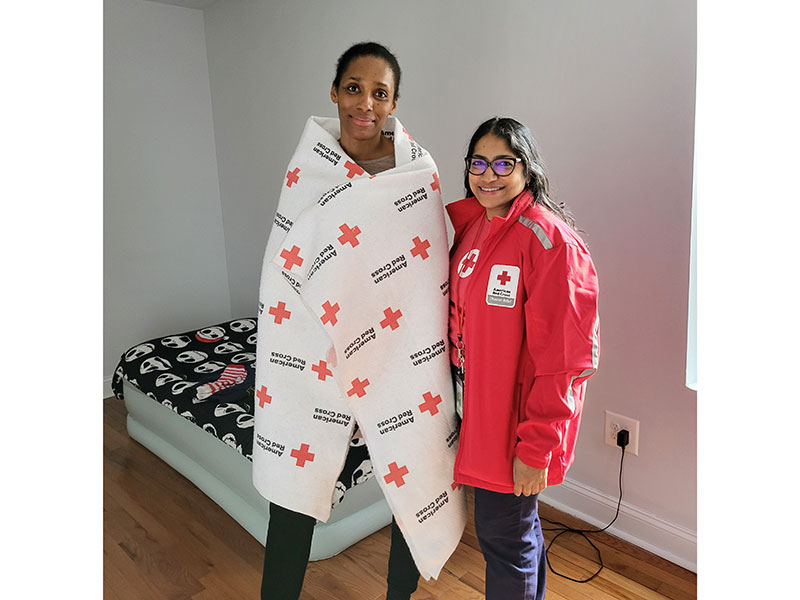
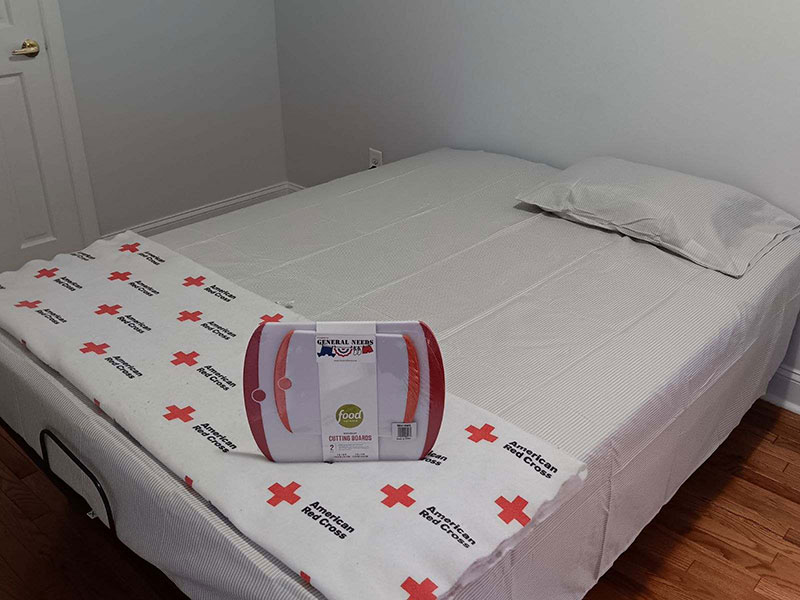
The Hero Care Network serves the U.S. Armed Forces and is available for military members, veterans, and their families 24 hours a day, 365 days a year. The Hero Care Network can help send emergency messages, such as when a family emergency occurs while a service member is stationed overseas, as well as meet critical needs such as connecting veterans in need of immediate aid with support resources or financial assistance. In an effort to meet the needs of today’s service members and their families, the Red Cross provides three ways to access assistance: 1) Call toll-free at 877-272-7337; 2) Go online at redcross.org/HeroCareNetwork; and 3) Use the Red Cross Hero Care mobile app.
Support all the urgent humanitarian needs of the American Red Cross.
Find a drive and schedule a blood donation appointment today.
Your time and talent can make a real difference in people’s lives. Discover the role that's right for you and join us today!